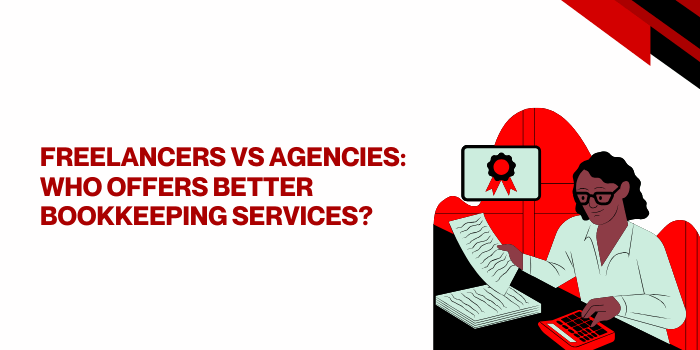 Business
Business
Freelancers vs Agencies: Who Offers Better Bookkeeping Services?
When managing business finances, the stakes are always high. Whether you’re a startup founder, an eCommerce entrepreneur, or a CEO scaling a multi-location enterprise, bookkeeping services are non-negotiable. It’s not just about tracking money in and out; it’s about ensuring your business stays compliant, audit-ready, and financially healthy.
As your company grows, the choice often narrows down to two paths: hiring a freelance bookkeeper or partnering with a professional bookkeeping agency. Both offer distinct advantages and challenges. But which one aligns better with your business needs?
Let’s break it down in detail.
Cost-Effectiveness: Balancing Budget and Quality
One of the first concerns for any business is cost. Freelancers usually offer more affordable hourly or project-based rates than agencies. Their lean structure and absence of overheads make them a go-to option for startups and small businesses.
However, affordability often comes with trade-offs:
-
Lack of redundancy (no backup if the freelancer is unavailable)
-
Limited range of services
-
Varying levels of expertise
Agencies, on the other hand, might charge more, but they often include:
-
Full-stack bookkeeping services
-
Multiple professionals handling specialized tasks
-
Greater accountability and structure
Verdict: If your budget is tight and your requirements are basic, freelancers may work. But for growing businesses needing structured financial oversight, agencies offer long-term value.
Expertise and Specialization: Breadth vs Depth
Freelancers tend to be generalists. While many have solid accounting knowledge and bookkeeping services experience, they might not always stay updated with regulatory changes, industry-specific rules, or advanced tools.
Agencies typically consist of:
-
Chartered accountants (CAs)
-
Certified bookkeepers
-
Tax professionals
-
ERP/software specialists
This multidisciplinary approach ensures accuracy, compliance, and consistency, especially important when managing payroll, GST filings, or inventory-heavy businesses.
Subsection: When to Prefer Specialized Expertise
-
Complex taxation scenarios
-
Multi-currency transactions
-
Auditing or investor reporting needs
-
Business registrations and legal compliance
Verdict: Agencies provide a broader, deeper skill set that reduces the risk of errors and missed deadlines.
Scalability and Flexibility: Adapting to Business Growth
What happens when your business expands? Can your bookkeeping support scale with you?
Freelancers:
-
Limited bandwidth for high-volume data
-
May struggle with increased frequency of reporting
-
Hard to replace quickly if they exit
Agencies:
-
Built for scale, can add more resources without delay
-
Use team-based approaches for continuity
-
Provide additional services like payroll, budgeting, and forecasting
Scalability isn’t just about size, it’s about response time, adaptability, and the capacity to evolve with your business.
Verdict: Agencies win when it comes to seamless scaling and operational flexibility.
Technology and Tools: Manual Processes vs Automation
The tools used in bookkeeping can significantly impact both accuracy and efficiency.
Agencies are more likely to use:
-
Industry-grade software (Zoho Books, QuickBooks, Xero, Tally Prime)
-
AI-powered reconciliations
-
Cloud dashboards for real-time financial views
-
Secure data backups and encryption
Freelancers may use similar tools, but with variations:
-
Limited automation due to cost
-
Basic spreadsheets or outdated software
-
Less frequent updates or tool integrations
Key Benefits of Tech-Driven Bookkeeping Services:
-
Fewer human errors
-
Faster reporting cycles
-
Better financial forecasting
-
Easier audit trails
Verdict: Agencies offer a more technologically advanced experience, ideal for businesses that rely on data for decision-making.
Accountability and Compliance: Who Takes Responsibility?
Bookkeeping isn’t just number crunching, it’s about being financially compliant and audit-ready. Any mistake can cost money, time, and credibility.
Agencies follow internal protocols, SOPs, and cross-verification methods that freelancers might lack. They typically:
-
Offer service-level agreements (SLAs)
-
Have internal QA processes
-
Provide official contracts for scope and liability
Freelancers, though sincere, may operate without formal contracts or insurance, leaving clients exposed in the event of non-compliance or penalties.
Bullet Points: Risks Without Proper Accountability
-
Missed tax filing deadlines
-
Incorrect financial statements
-
Higher chance of triggering audits
-
Lack of recourse in case of disputes
Verdict: Agencies provide peace of mind with well-documented processes and legal safeguards.
Communication and Project Management
Efficient bookkeeping needs clear, consistent communication.
Freelancers:
-
Typically manage everything themselves
-
Limited availability (especially during peak tax seasons)
-
Risk of delays due to illness, personal obligations, or other clients
Agencies:
-
Dedicated account managers or support teams
-
Fixed response times and availability across time zones
-
Structured communication workflows via project management tools
This becomes crucial when you’re closing books, preparing reports for investors, or syncing finances with other departments.
Verdict: Agencies offer a more reliable communication channel, especially for time-sensitive tasks.
Customization and Personal Touch
Freelancers often develop closer relationships with clients. This can lead to more personalized service, deep familiarity with your business, and a consultative approach to challenges.
Agencies, although more structured, may sometimes feel impersonal, especially when your account rotates between staff.
What Matters More:
-
Do you prefer a hands-on partner who knows your history?
-
Or a well-oiled system with processes and team support?
Verdict: Freelancers win on personal attention; agencies shine in structured delivery.
Bookkeeping Services in India: Local Knowledge Matters
When hiring for bookkeeping services in India, both freelancers and agencies can bring valuable local insight. However, agencies often maintain dedicated compliance teams that stay current with:
-
Indian taxation laws (GST, TDS, Income Tax)
-
MCA compliance and ROC filings
-
Digital invoicing regulations
-
Banking and statutory audit guidelines
For businesses operating within India or serving Indian clients, this compliance edge matters more than cost alone.
Final Words
Choosing between freelancers and agencies for bookkeeping services in India ultimately depends on your business’s size, complexity, and long-term goals. Freelancers may offer a cost-effective and personal approach, making them ideal for startups or small businesses with simpler needs. However, agencies provide structure, scalability, and comprehensive expertise, which are essential for growing companies that require accuracy, compliance, and consistency.
By evaluating your specific requirements and expectations, you can partner with the right service provider who will support your financial operations and contribute to your business’s success.
Read Our Recent Article – How to Find and Hire a Virtual Bookkeeper on a Budget









